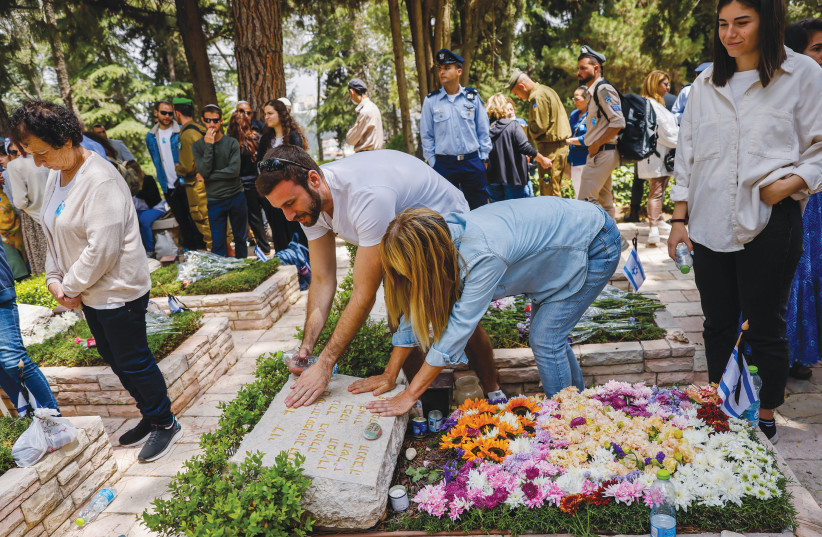Without visiting all the military cemeteries in the country, it is impossible to estimate, let alone grasp, the enormous price in human life that Israel has paid for national security since, and even before, the establishment of the state.
It goes way beyond statistics, as was evident at the President’s Residence on Tuesday, when President Isaac Herzog and his wife, Michal, hosted representative families who lost loved ones in all the wars and battles in which Israel was engaged since the 1967 Six Day War, till the current Gaza war that began on October 7, 2023.
Most of those present knew each other from previous events organized by the Defense Ministry, Yad LeBanim, the Prime Minister’s Office, and the President’s Office.
The aftermath of overwhelming loss
But there was one family who was there for the first time. The father spoke of his daughter Shiri, who had been an officer with an unarmed surveillance unit of female soldiers, whose warnings about the Hamas activity they spotted had gone unheeded.
Shiri had been assigned to kibbutz Nahal Oz and was among the soldiers who were murdered by Hamas.

Her family had been approached many times with requests for interviews but had declined. Shiri was their private loss and they did not want to make their grief public. They wanted to mourn her privately. But the time had come, said her father, to let the world know about how talented Shiri was. She had admirable leadership qualities, a gift for music, a charismatic personality, and was loyal to her friends – and so much more.
Two other fathers had each lost two sons. They had probably told their stories many times, but each telling was an emotional hurdle. One of the fathers broke down and wept.
It was heartbreaking to see middle-aged and elderly women who had been left young widows with small children and babies as long as half a century ago and more, sitting alongside more recent war widows and their children who will grow up without a parent.
Details of the military service of each of the fallen soldiers whose families were among the speakers were read out, but mothers, wives, and offspring preferred to speak of the personalities of their loved ones – the smile, the work they did in their private lives, the interest they took in their children, their kindness, involvement in the community, generosity of spirit, the ability to quickly make friends, popularity... and then some.
As widows spoke, other widows were seen wiping tears from their eyes. There were so many identifying characteristics that also applied to the husbands they had lost in their defense of Israel.
Some of the fallen soldiers and/or their wives were the sons and daughters of Holocaust survivors who had never imagined when they came to Israel that they would attend the funerals of their offspring.
Notably, the gathering took place while the debate over military service by eligible haredim was still raging.
It was impossible to miss the number of women wearing the turban-style head covering that is part of the dress code in religious Zionist circles, nor the number of men wearing kippot and ritual fringes.
One could argue that if religious Zionists are able to serve in defense of the country without forfeiting their Torah studies, surely haredim can do the same, and go into battle reciting the Book of Psalms.
After listening to an account of what his father had done in the army, and how brave, intelligent, and resourceful he had been, one young man declared: “He was a lot of things, but to me, the most important was that he was my dad.”
Commenting on the collective tragedies of loss, Herzog thanked the families for choosing life rather than dwelling in misery.
On Sunday evening, May 12, Herzog will address bereaved families who will gather at the Western Wall plaza in Jerusalem for the official state ceremony in memory of fallen soldiers.
On Tuesday, May 14, Herzog will host the traditional Independence Day ceremony, honoring 120 outstanding soldiers serving in the IDF.
This year’s ceremony will be low-key in comparison to those of past years due to the war with Hamas, the continued captivity of Israeli hostages in Gaza, and the massacre of October 7.
